World Seagrass Conference 2022, Annapolis Maryland
Emma A. Ward
Institute of Marine Sciences, School of Biological Sciences, University of Portsmouth
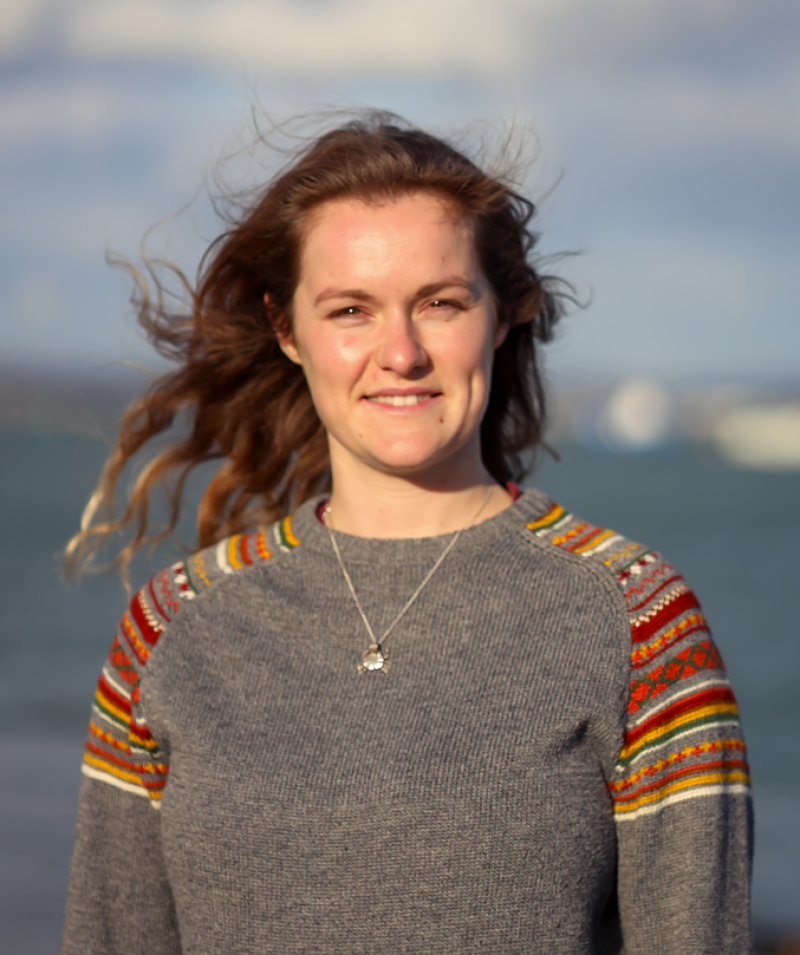
Thanks to a Challenger Society Student Travel award I was able to attend the 2022 World Seagrass Conference and 14th international seagrass biology workshop this year (7-12th August) in Annapolis, Maryland, USA, with Chesapeake Bay as a fitting backdrop. This was this first time during my PhD that I have been able to attend and present at a conference in person! Given I was presenting the meta-analysis that I completed when working from home during the second UK covid-19 lockdown, it felt even more poignant that we were all able to meet in person to share our research success from the last two years. In fact, during day one I was able to utilise the event to foster some in-person connections, as I was finally able to meet face-to-face with two of my co-authors from an international collaboration on the range expansion of Marinomyxa marina, a phytomyxid parasite found within the seagrass Halophila stipulacea (doi.org/10.1016/j.aquabot.2022.103554). Which is a collaboration that began during my master’s research when I was based at the University of Essex.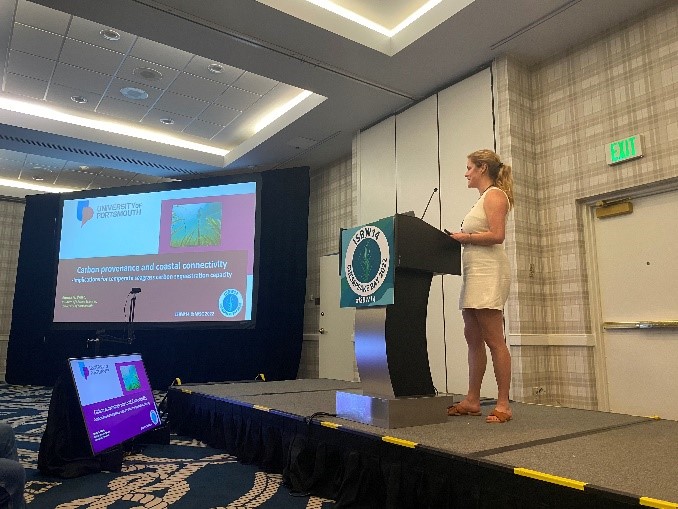
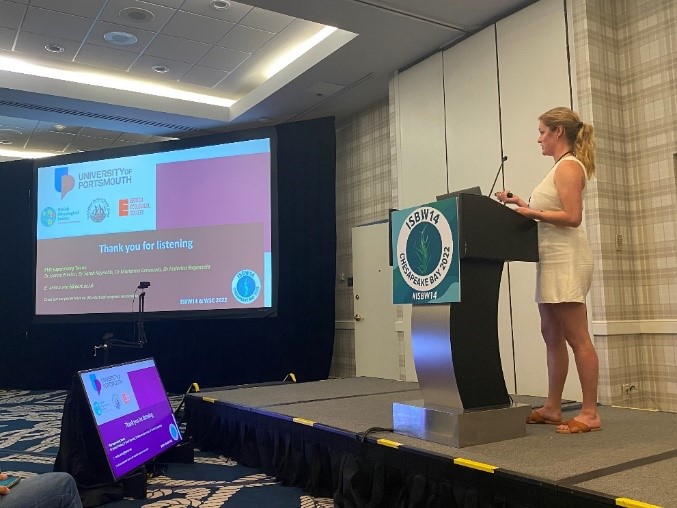
Figure 1. Presenting my talk on carbon provenance and coastal connectivity at WSC2022 and ISBW14.
Day two provided me the opportunity to showcase the current research I am working on; firstly, presenting my meta-analysis on coastal connectivity and carbon provenance in the carbon ecosystem services session; secondly, presenting in the poster session some of the active intertidal seagrass restoration work we have been undertaking at the University of Portsmouth with our partners and collaborators (The Hampshire and Isle of Wight Wildlife Trust; Boskalis Westminster and Wightlink ferries). My meta-analysis collates an updated global synthesis of δ13C analyses from seagrass sediments and leaves, enabling its categorisation into seagrass bioregions alongside grouping by seagrass species size. This updated global database demonstrates that a meadow’s seagrass species composition and placement within the seascape influences its carbon sequestration capacity. The seagrass restoration poster also focused on ecosystem services provision, but instead those potentially supported by restored intertidal seagrass (Zostera noltei) in the UK.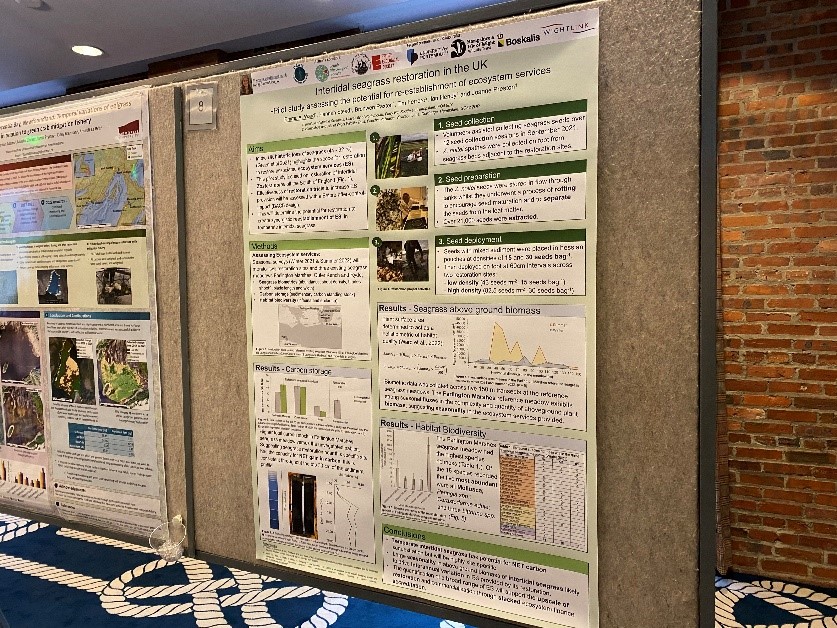
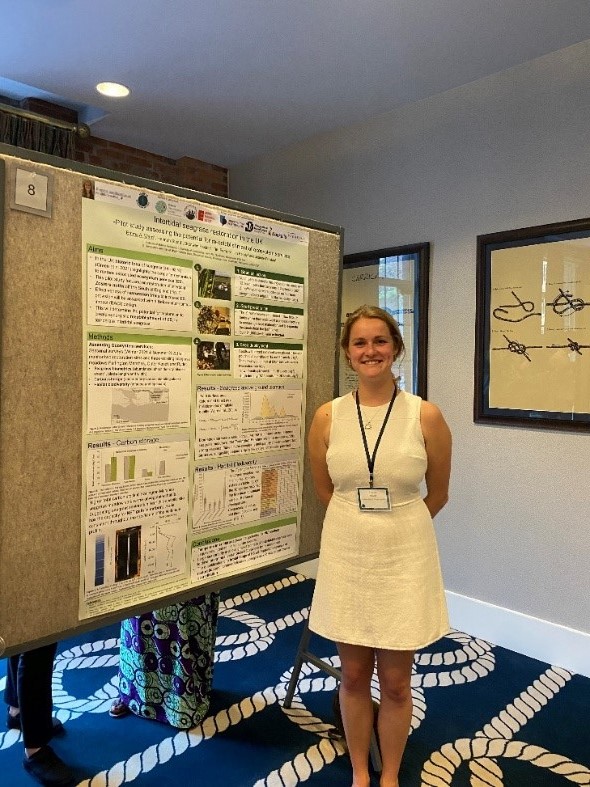
Figure 2. Tuesday evening’s Poster session showcasing our UK intertidal seagrass restoration. Project partners; University of Portsmouth, The Hampshire and Isle of Wight Wildlife Trust; Boskalis Westminster and Wightlink ferries.
The week was completed with; a field trip out onto Chesapeake Bay to explore the seagrass via boat and snorkelling; and with some engaging workshops. I really hope I will be able to join the next World Seagrass Meeting (ISBW15) in 2024, as the conference is certainly one, I would recommend. I again what to take to the time express how I really appreciate the support I received from the Challengers Society, this made my attendance possible and without whom I would not have had the fantastic opportunity to present at this international conference.
Who am I?
I am a second year PhD student at the University of Portsmouth studying the carbon sequestration capacity of seagrass in the UK. Prior to starting the PhD I was simultaneously a Marine Conservation supervisor at Archipelagos Institute of Marine conservation and a Masters research student at the University of Essex. I also undertook my undergraduate degree at the University of Essex where I found my particular interest for seagrass research having the opportunity to explore the seagrass beds of Greece, Tanzania and Indonesia.
Latest News
Marine Data Management, Governance and the MEDIN toolset
The Marine Environmental Data and Information Network (MEDIN) and OceanWise are delighted to invite you to attend our popular free online training workshop: ‘Marine Data Management, Governance and the MEDIN toolset’ on the 19th – 23rd of May 2025.
Workshop on the contribution of UK Arctic Ocean science to the International Polar Year 32/33
12:00 11th June – 16:00 12th June 2025: NOC Southampton (In-person with online option): Registration deadline 16th May
REGISTER HERE
Pre-meeting questionnaire (open to all)
The purpose of this workshop is for the UK Ocean Science community to discuss and then draft a prospectus document outlining the priority Arctic research questions the community would like to address during the run up to, throughout and beyond the International Polar Year 32/33. Additionally, to identify what unique strengths and technologies the UK has to help fill these knowledge gaps.
The second day of the workshop will be dedicated to writing groups, one for each of the priority research questions identified - from both the pre-meeting questionnaire (HERE) and day one discussion. By the end of the meeting, each group will have produced draft text and sourced supporting figures for the prospectus.
Post meeting, the draft will be opened for comments and suggestions from everyone, regardless of whether they were able to attend the workshop or not. It will then be shared with UK funders (UKRI, FCDO, DSIT, ARIA) and potential international programmes with whom we would like to collaborate (e.g. Arctic 2050, Norway). It will form a basis from which wider integration with terrestrial, atmospheric and cryosphere communities can be built, e.g. at the UK Arctic Science Meeting in September in Northumbria.
To ensure balanced community and ECR representation, and to ensure that the size of the writing groups is efficient and effective, if the number of registrations from individual institutes becomes overwhelming, we may contact individuals or teams and ask that each institute selects a smaller number of individuals to attend in-person. Please wait for confirmation of in-person attendance before finalising travel arrangements.
The workshop will be open to hybrid attendance and contributions on both days.
Challenger Society Council Position Vacancy
The Challenger Society for Marine Science (CSMS) are pleased to announce an exciting opportunity to support the next generation of ocean scientists and innovators. CSMS are looking for a new Council member to fill the Student Travel Awards and Stepping Stones Portfolio. The successful applicant will administer the travel and research grants available for Early Career Researchers.
The role involves:
- Receiving applications for the two schemes and responding to applicant inquiries
- Soliciting and compiling input from the rest of the Council for assessing the applications
- Communicating with successful and unsuccessful applicants for the two schemes
- Working with the Honorary Treasurer on allocating funds to successful applicants
- Following up with award winners on their reporting requirements
- Attending Council meetings four times a year (in person or online) and contributing to discussions and decision making for CSMS
The usual term for Council members is three years.
For more information about the CSMS Council, please follow this link: https://www.challenger-society.org.uk/The_Council
For more information about our Early Career Researcher grants and awards, please follow this link:
https://www.challenger-society.org.uk/Stepping_Stones
and
https://www.challenger-society.org.uk/Travel_awards
If you are interested in applying or have any questions regarding the role, please contact kathen@bas.ac.uk
